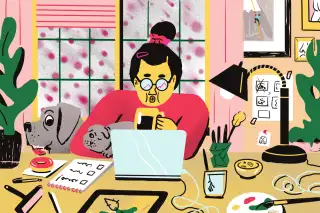A Freelancer's Guide to Managing Job Uncertainty During the Coronavirus Crisis

As the country grinds to a halt over COVID-19, and the federal government discusses sweeping legislation to help businesses and employees, freelancers may be left wondering: What's in it for me?
Freelance workers—which can include everyone from journalists and photographers to teachers and truckers—contribute $1 trillion to the economy, according to an October 2019 study by Upwork and the Freelancers Union. Yet their careers are often treated by policymakers as cute little hobbies meant to fill time until a “real” job comes along.
“Freelancers are facing one of the most difficult times in modern history,” says Rafael Espinal, president of the Freelancers Union. “I don’t believe government has caught up to how we can be helpful to that population.”
In some ways, the financial precarity many Americans are now facing is “business as usual” for everyone who depends on contract work to make ends meet. Clients come and go, flush months compensate for lean ones. Hopefully, through it all, a savings account builds.
Still, if you’re one of the 57 million Americans who make up our freelance workforce, the next few months aren’t going to be easy.
Here are some tips for freelancing in a time of crisis.
Evaluate your finances
If you’re lucky, you already have enough money saved up in your emergency fund to get you through the next few months. A good rule of thumb is to have 3-6 months' worth of income in the bank. If you live in an expensive area, or have kids or other family members to support, it’s “often beyond,” says Douglas Boneparth, president of Bone Fide Wealth, which specializes in financial planning for freelancers.
No matter how much (or little) savings you have, you should take a serious look at your expenses and start cutting back immediately.
“Do everything you can to increase cash savings and liquidity to prepare yourself,” Boneparth says.
It may be tempting to tap into retirement accounts early, including 401(k)s. But Boneparth cautions that, “People take the biggest step backward when they start to erode long-term savings for the sake of survival.” Some freelancers may have no choice, but it helps to be aware of tax penalties when withdrawing from these accounts, and at least for your own peace of mind, have a plan for continuing to save once things get back on track.
If you’re part of a union or professional organization, don’t be shy about checking in with them to see what kinds of assistance are available to you. “We’re at the beginning of planning a relief fund to provide immediate cash to freelancers in dire situations," Espinal says.
Adjust your skillset
Freelancers have always been scrappy, but Covid-19 is making them hustle even harder.
“I’m seeing freelancers being very creative,” Espinal says. “Fitness instructors are using YouTube videos or Instagram, makeup stylists are giving tutorials on the internet ... ”
Think about your current client base, the needs you’ve filled for them in the past, and how you can be of help in other ways. If you’re a freelance writer who writes regularly for a company’s blog, perhaps you can pen a newsletter about COVID-19 developments that goes out regularly to reassure their clients. If you’re a photographer with an Instagram following, maybe you can create and stream tutorials from the comfort of your own home.
Things are moving fast, Espinal says. "It’s important to take it day by day.”
Tutors, for example, may have felt they were facing dire straits when "social distancing" began a couple of weeks ago. But now that schools are closing, they’re in high demand for parents keen on home-schooling their kids. Medically vulnerable people who are trying to stay home may need someone to walk their dog, which could also be a boon for freelancers looking to take on extra gigs.
Sites like Behance, Upwork, and Fiverr list creative jobs that can mostly be done remotely, while TaskRabbit is more likely to advertise one-time gigs that need to be done in person.
Use extra time for planning and training
Even if you can’t earn right now, you can still invest in your business by learning how others in your industry have weathered downturns in the past.
Many successful freelancers offer business plans and courses online. Like content marketing writer Jennifer Goforth Gregory, who posts an “action plan” for gaining new clients on her blog every January — a particularly slow month for many freelancers.
If you think of “self-quarantine” as an extended “January,” you can use the extra time to make a business plan for the rest of the year, or take an online training course. Gregory’s website is a great resource for writers looking to get into corporate work, but the internet is a treasure trove of free courses for photographers, painters, podcasters, and designers.
Connect within your network — and outside of it
At some point this will all be over and we'll be back at our coworking spaces, and it will be crucial for us to take a long look at the types of policies that can protect workers of all kinds — like paid sick leave, disability insurance, and programs that increase financial literacy.
“Going forward, we need to have a bigger conversation about how to support the independent workforce,” Espinal says.
The Coronavirus crisis has revealed just how interconnected we all are, whether we’re full-time employees, small business owners, or gig workers. And we’ll only get through this mess if we do so together.